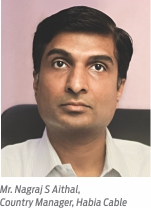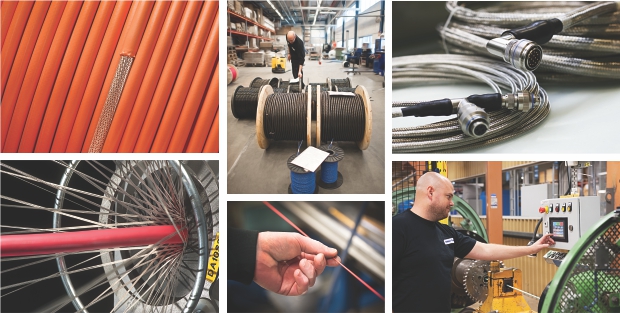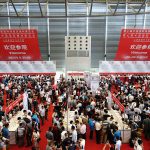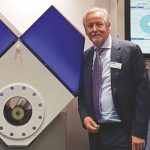Habia Cable AB, present since 2009 in India, offers standard and custom-designed cables and harnesses for demanding applications. The company caters to the customers in the telecommunications, nuclear power generation, defense, offshore, and industrial sectors. In its markets, Habia Cable is today one of Europe´s leading wire and cable manufacturers. The company has a global presence with customers in more than 50 countries.
 Wire & Cable India recently interviewed Mr. Nagraj S Aithal, Country Manager, Habia Cable to know the company’s business activities and priorities in India. Here are the excerpts:
Wire & Cable India recently interviewed Mr. Nagraj S Aithal, Country Manager, Habia Cable to know the company’s business activities and priorities in India. Here are the excerpts:
Wire & Cable India: Kindly provide our readers a brief introduction of Habia Cable?
Nagaraj S Aithal: Habia Cable AB is a Swedish company having four manufacturing locations, in Sweden, Germany, Poland, and China. In 2009, Habia started operations in India and subsequently started catering to industrial, defense, nuclear, and telecom sectors. In Sweden, our company is a part of Beijer Alma Group – a leading spring manufacturer listed on the Stockholm Stock Exchange. We fulfill the special application demands of the customer, for instance, customized, high-temperature wires and cables, coaxial cables, and cable assemblies and harnesses for various sectors.
WCI: Would you share with us how you grew your business in India since 2009. Give us the breakup of your revenue accruing from various sectors you cater to.
NSA: We believe in transparency, reliability, and integrity. We started back in India with few thousand Euros and steadily grew up to reach 1.5 million Euros business currently by catering to all types of customers including the ones in telecom, nuclear, industrial, and defense sectors. Habia now has a good base in India with a small team in Bangalore and covering sales all over India. We have requisite number of stockists and distributors in different places like Bangalore, Hyderabad, and Chennai.
As for the revenue breakup, about 40 percent business comes alone from the industrial sector; rest 30 percent comes from defense with 30 percent from telecom and nuclear.
WCI: Tell us about the products and product portfolio of your company.
NSA: Habia Cable has absolute command and specialization over the plastic materials for insulation/jacketing material like low smoke zero halogen, high-flex life, high temperature, fire retardant etc. With a comprehensive understanding of the customer requirements, Habia Cable delivers to a wide range of environments, from permanent installations to highly dynamic applications. We work closely with engineers to supply best wires and cable solutions that will fulfill all aspects of the functionality and reliability of a system. By providing a cable that is custom-designed to the requirements of the application, with low minimum order quantities and short delivery time, we believe we can provide a better and more economical service to our customers.
We offer high-performance cables and harnesses for demanding applications and remain in direct contact with knowledgeable sales staff as well as design engineers. Besides, we have the ability to develop bespoke solutions that fulfill unique requirements and have flexible manufacturing, low minimum order quantities and short lead times. Our quality systems meet the most stringent requirements.
WCI: You said something about being a specialist in plastic materials. Please elaborate.
NSA: We make cables for various specialized and demanding applications, where specifications and standards are some of the toughest. Each of these specialized requirements demands cutting-edge compounding solutions to meet specifications, which we meet through selecting the right raw materials.
To give a boost to our industrial segment, we are now concentrating on high-temperature cabling needs of the steel industry. For example, Tata Steel, one of our biggest clients, was much concerned about frequent failure of power cables due to close exposure to molten iron/high radiation. As the molten spatters were burning the jacket on the cables, some operations were hindered resulting in a loss of several tonnes of production.
We designed a 4 Core, 70 SQMM power cable with Habia Flame Insulation with a special jacket that could withstand a temperature up to 800-1000 degree centigrade. Now, this ladle car is running successfully in the plant from past 12 months without any failure. We are mainly concentrating on these types of cables – high temperature for the steel industry.
WCI: How is the business for Habia in India currently? What is the strategy to increase the market presence and business over time?
NSA: In the past, we had good growth in the telecom sector (BTS Antenna Manufacturers) for our flexiform cable (semi-rigid). So due to ups and downs in the telecom market, we are now concentrating more on special and customized applications. The major BTS antennas are now coming from China and Korea. Our supply of cable for base station antennas thus suffered slightly in India. We still supply these cables, not to local manufacturers, but rather to major R&D centers, which in turn, are supplied from Habia Cable China plant to major antenna manufacturers in China and Korea.
Our business in India has grown only on account of best quality, absolute customization of cables as per client’s specifications; for instance – fire resistance, flame retardancy, high-temperature endurance, multi-core hybrid cables and industry standards (MIL Spec, Def Standard, BS Standard, UL). All the requisite ingredients stand ready with us to manufacture the customized cables in no time.
For the future growth, we are planning to increase our participation in the exhibitions and more one-to-one engagement with potential customers. We participated in Electronica last year and DefExpo this year. We are targeting more customers through different marketing channels.
WCI: Elaborate a bit about the nuclear applications, where your cables are used.
NSA: Nuclear reactor’s inner chambers are characterized by extremely high radiation. We have a product called PEEK (Polyether ether ketone) cables, which are cables with PEEK insulation and go inside the reactor. PEEK is a very tough material which can withstand the toughest environment. The material is similar in many ways to fluoropolymers, but without the halogen content. It is very difficult to process. Special characteristics of PEEK are excellent mechanical properties, chemical resistance, fire resistance, low smoke and toxins, and excellent resistance to radiation and abrasion. These properties make it apt for nuclear applications.
Our Major market for PEEK cables is in South Korea. In India, we supply some PEEK cables to Nuclear Power Corporation of India Limited (NPCIL) and their sub-contractors for sensor kind of applications.
WCI: In various niche segments, you are supplying to PSUs. How is your relationship with the Govt. agencies or these state-owned entities?
NSA: For PSUs like BEL, BHEL, ECIL we are one of the preferred suppliers as it is easy for us to work with their designs and commercial aspects. The government agencies normally go with the direct procurements and deal directly with manufacturers who are flexible in commercial and technical aspects to fulfill their exact requirements.
WCI: Does Habia have any plan to manufacture in India with some sort of JV?
NSA: We tried to have a JV with one of the manufacturers. However, the venture failed to take off because of certain commercial aspects like the import duties and other hidden costs involved in this process. But still, we are open to explore this opportunity and manufacture some standard products in India and will wait for the right time and right partner to cooperate with us.
WCI: Tell us about the Indian wire and cable industry in general and how Habia Cable looks forward to participating in the growth.
NSA: We see a good potential in various industries and applications. We are now well established as a leading customized/special wire and cable manufacturer in the market. Also, with many offset programs, we are leading the foreign manufacturers to make in India due to the ease of doing business and project/design transfers from America and European countries. This is because we have skilled labors, efficiency/productivity, and better infrastructures in our country.





